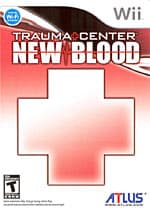It Takes Two
When the Wii launched last year, it was met with open arms by hardcore and casual gamers alike. It had quite a few great initial titles, with perhaps the most interesting being Trauma Center: Second Opinion. It was an updated Wii version of a cult classic DS game that allowed players to perform virtual surgeries using the Wii-mote instead of a stylus. It was met with great critical acclaim and garnered an admirable number of fans. It is now a year later, and Atlus has given gamers another reason to pick up their virtual scalpel and save some lives. Since New Blood was designed specifically for the Wii, not just ported up like Second Opinion, gamers were rightfully eager to see how the series would progress.
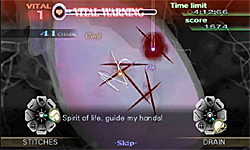
New Blood’s story revolves around two doctors, Markus Vaughn and Valerie Blaylock. You start the game operating in a rickety old hospital in the middle of nowhere and progress to being a top surgeon in a busy big city hospital. Along the way, there is a ton of drama as you save accident-prone patients and learn about a new disease known as STIGMA. The storyline, while a little overly dramatic, is still quite engaging and will definitely keep you playing through the game’s many surgeries.
Perhaps the biggest benefit of this game’s story comes in how it is told. This time around, Trauma Center’s storyline has been given special treatment. Since all of New Blood’s storyline has been voiced over, players will no longer have to read seemingly endless dialog boxes to know what is transpiring. The quality of these voice-overs is top notch, making the storyline seem much more compelling.
Every surgery is preceded and followed by voiced “cinematic” scenes that convey the game’s story. I hate to call them cinematic scenes because they are still just static drawings of characters placed in front of drawn static backgrounds. Considering the improvements implemented in the audio department in this game, it would have been great if this clear leftover from the DS days of the series had been improved upon as well. While it would have been nice to have real cinematics, these scenes don’t detract from the experience that much. Instead, they will just disappoint anyone who wants to see this aspect of the Trauma Center series move forward.
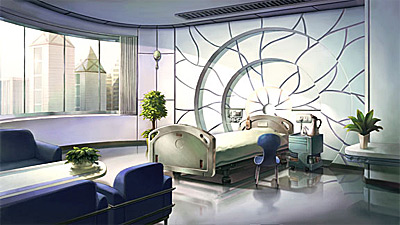
Although the cinematics remain virtually unchanged, the game’s overall graphics got a slightly noticeable upgrade over Second Opinion’s. While this upgrade may not be drastic enough to surprise fans of the series, it is still good to see Atlus taking better advantage of the Wii’s hardware capabilities. I believe that it is possible for the game to look better than it does, but who honestly wants a realistic looking Trauma Center? The surgical aspect of the game can be somewhat off-putting to more squeamish gamers as it is, even without photo-realistic looking graphics. As with the previous titles in the series, the stylized graphics look great and keep the game from being downright gross.
As you play, you will be treated to some very interesting surgeries to perform. The sheer variety and obscurity of these surgeries keep players constantly on their toes and entertained. One surgery, you will be repairing broken bones sustained during a fight with a grizzly bear and the next, you will be zapping STIGMA cells with your trusty laser. There are also some interesting context sensitive events that occur that spice up the gameplay even more. A good example of these occurs during a surgery involving a young girl. While trying to resuscitate her, you are unable to use the defibrillator because of her age and condition. You are then forced to manually massage her heart to keep her alive by timing button presses with onscreen cues. While events like this aren’t new to games, they fit rather nicely into the mix of chaotic precision that is required while performing surgeries.
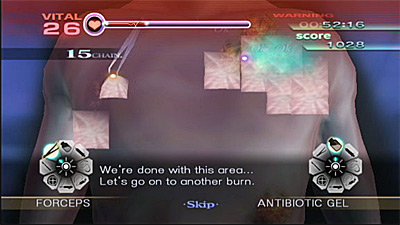
The controls in New Blood function virtually identically to those found in Second Opinion. You will use the analog stick on the Nunchuk to select the appropriate tools and a combination of the A and/or B button to execute their uses. Most of the tools will also require you to aim the Wii-mote at the screen to guide their usage. All of these controls work rather well except for the occasionally noticeable glitch. One particular part of the game has you replacing a patient’s pacemaker. During this surgery, even when performing it correctly, it was extremely difficult to correctly reattach the wires to the patient’s heart. It seemed that no matter how I tried to place them, the game would register it like I had made a mistake. Occurrences like this are very few and far between, but it can still make the game more frustrating than it needs to be.
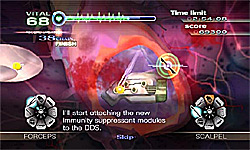
Another thing that will almost certainly frustrate players is this game’s insane difficulty level. Even while playing on easy, only the first few operations are relatively simple to complete. After that, the game seems to switch into an alternate difficulty mode rarely seen in games this day and age. Fortunately, the controls are intuitive and work well enough to give you a fighting chance if you are quick, skilled, and precise. Still, this seemingly crushing difficulty level will most likely turn off many gamers looking for a more casual gaming experience. For players looking for a challenge however, this is one of the most enjoyable difficult games that I have played in the last ten years.
Casual gamers can probably still enjoy this game, but only if they have a friend who likes performing virtual surgeries as well. New Blood features a much improved co-op mode that will allow two doctors to operate at the same time. Besides gaining the advantage of a second set of hands, playing with a friend also gives players the ability to utilize both of the doctor’s healing touch abilities. Having the ability to both slow down time and stabilize a patient’s vitals during an operation makes the game’s otherwise challenging operations much more manageable. This really is an enjoyable way to play through this game and will most likely be the best option for many players.
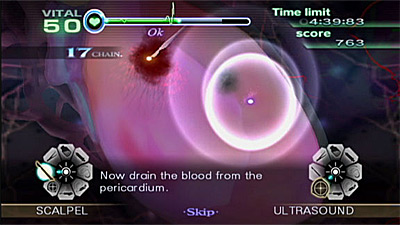
Basically, New Blood contains everything that we’ve come to love about the Trauma Center series. Although the “cinematics” remain fairly archaic, the noticeable bump to its graphics and the excellent addition of voice work makes New Blood a more compelling experience overall. Anyone looking for a challenge, or a game to play with a friend, should definitely give this game a try. Once again, Atlus proves that a company’s name doesn’t have to be Nintendo to be able to release a great Wii game.
Features:
RATING OUT OF 5 RATING DESCRIPTION 4.2 Graphics
While not incredibly realistic, these stylized graphics are sharp and have received a noticeable improvement over Second Opinion’s. 4.3 Control
The controls are very intuitive and accurate, with only the occasional minor issue. 4.5 Music / Sound FX / Voice Acting
The addition of some good voice work greatly improves New Bloods overall experience. 3.8
Play Value
While the gameplay is fun if you are looking for a challenge, many players may be forced to find a friend to play with because of the game’s incredible difficulty level in single player mode.
4.1 Overall Rating – Great
Not an average. See Rating legend above for a final score breakdown.
